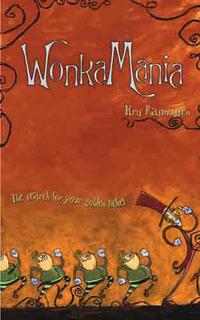Review: WONKAMANIA
One of this summer’s expected blockbusters is Charlie & The Chocolate Factory, releasing in July and supposedly sticking closer to the original Ronald Dahl book than the Gene Wilder Willy Wonka version. Tim Burton and Johnny Depp are re-interpreting the story of an eccentric candy maker and the search for a successor to his sugary empire. Along the way, we meet the surprising and mischievous Willy Wonka, his helpers the Oompa Loompas, and a group of children that have, shall we say, serious character flaws.
 In Wonkamania: The Search for Your Golden Ticket (© 2005, Thirsty/Tyndale Publishing), Kris Rasmussen succeeds in taking the book and the first film, looking at the plot points and the metaphors thrown out by the characterizations, and noting some really thoughtful points concerning our lives and the way we are to live life. Yes, it’s a devotional, and yes, it’s got talking points and “further discussion”, and yes it is full of sidebar information from behind-the-scenes sources. And yes, it could have been really sappy and preachy in pointing out the sins of the children and the possible messiah-complex of their host. But no, it doesn’t go there – and as a devotional that’s different and just a bit sugary, it works to make the reader think about life, the universe and everything.
In Wonkamania: The Search for Your Golden Ticket (© 2005, Thirsty/Tyndale Publishing), Kris Rasmussen succeeds in taking the book and the first film, looking at the plot points and the metaphors thrown out by the characterizations, and noting some really thoughtful points concerning our lives and the way we are to live life. Yes, it’s a devotional, and yes, it’s got talking points and “further discussion”, and yes it is full of sidebar information from behind-the-scenes sources. And yes, it could have been really sappy and preachy in pointing out the sins of the children and the possible messiah-complex of their host. But no, it doesn’t go there – and as a devotional that’s different and just a bit sugary, it works to make the reader think about life, the universe and everything.It’s easy to point fingers at the characters and be able to see in hindsight what their fatal flaws where, what kept them from ultimate consideration in Wonka’s master plan. Mike is the boy who loves television and would spend his life as a couch potato if that’s what’s available; Veruca is impatient and wants everything now now now; Violet brags about every little thing, competitive to a fault. Other characters and situations are open for interpretation and application for spiritual guidance, too. What’s really positive about this book and the experience of devotionalizing through it day to day is that Rasmussen doesn’t simply pull out the bad characteristics and the good characteristics and provide a prooftexted spiritual point or two. She digs into the culture today for current stories and applications, and she asks hard questions about what laziness really is (Mike might be a slacker, but it’s laziness plus willful apathy that brings disobedient slothfulness); about what it means to be selfish and to raise kids properly (Violet is a braggard, but her mother’s perfectionism is as much to blame); about how “good people” have their faults and bad tendencies (even Charlie isn’t perfect, showing his own shortcomings in the tour through the factory).
Without being preachy and talking down to her audience, which would be easy with what amounts to a children’s book and a PG kids’ movie, Rasmussen makes the reader think about what’s important in living life, what’s meaningful in dealing with others, and what’s fun about a tour through a candy factory that tastes good and might help us grow spiritually, too.



0 Comments:
Post a Comment
<< Home